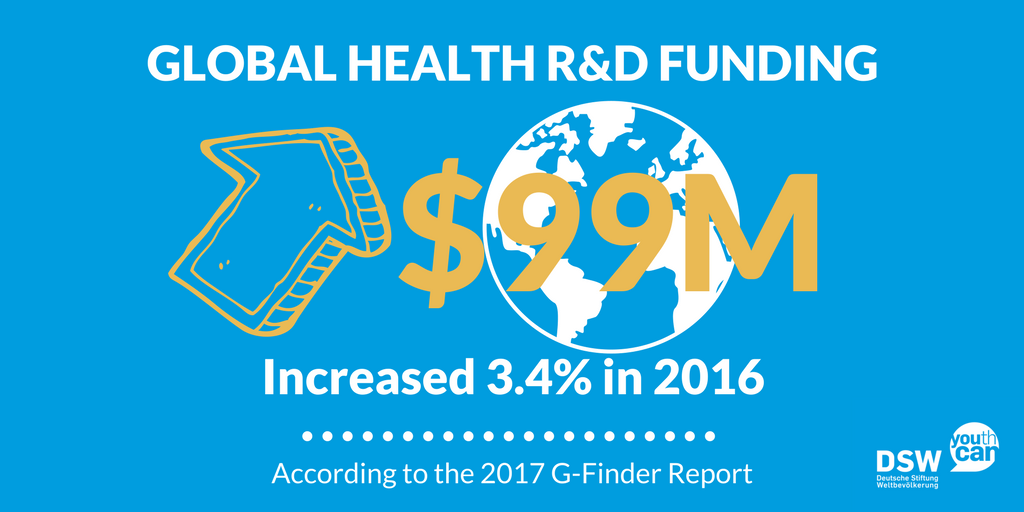First increase in five years for global funding for neglected diseases research, but Trump and Brexit cast doubts on future investment
According to new data in the annual G-Finder report published today, the UK has regained its place as the second-largest funder of global health research focused on HIV & AIDS, tuberculosis, malaria, and neglected tropical diseases, as annual global funding rose $99m in 2016. Download the report here.
Brussels, December 13, 2017: A new report launched in London today reveals that the United Kingdom has overtaken the European Union as the world’s second-largest public funder of global health research targeted at HIV & AIDS, tuberculosis, malaria and neglected tropical diseases. UK funding for global health innovation increased 10% to $101m, bucking fears about a Brexit-related hit to UK investment.
“A temporary blip – hopefully”
EU support for research funding dropped almost 40% to $77m in 2016. The G-finder report attributes this reduction to uneven disbursements by the European Commission to the EU’s main funding instrument in this area, the European and Developing Countries Clinical Trials Partnership (EDCTP).
Cecile Vernant, Head of Deutsche Stiftung Weltbevölkerung’s (DSW) EU office, said: “Given that the EU has been a strong supporter of global health research in recent years, we expect – or at least we hope – that this sharp decline in 2016 is just a temporary blip in funding caused by the usual complexities of EU bureaucracy and budgetary procedures.”
2016 – Highest level of funding in 5 years
The tenth annual G-FINDER report, launched today by Policy Cures Research at an event in London, found that $3.2bn was invested in global health research in 2016, a year-on-year increase of 3.4%. After several years of declining funds for global health research, this is the first increase in five years. While the decline in funding levels has been arrested, investment is still below the peak levels from 2008. The authors of the G-finder report largely attribute the increase in health research funding in 2016 to renewed US investment. After falling to the lowest levels ever recorded in 2015, US government funding revered this decline with a $78m injection of money into the sector. The US government remains the largest public donor in global health research, and is responsible for 47% of all global funding for neglected diseases R&D, and 73% of all public sector spending.
Cecile Vernant: “The increase in 2016 is good news, but it does show how reliant we are on the decisions of one donor – the US government. What we don’t yet see in the data for 2016 are the potential consequences for global health of the decisions the Trump administration has sought to push through since coming into office.
“With the uncertainty in Europe about the impact of Brexit on global health funding, this certainly isn’t a time for complacency. We want to see ambitious EU plans in 2018, to pre-empt any negative consequences from external factors.”
G-FINDER 2017: Neglected diseases research and development – Reflecting on a decade of global investment. The full G-FINDER report can be found here and at: http://www.policycuresresearch.org/g-finder/
Notes to the Editor
- Deutsche Stiftung Weltbevölkerung (DSW) is a global development organisation that focuses on the needs and potential of the largest youth generation in history. We are committed to creating demand for and access to health information, services, supplies, and economic empowerment for youth. We achieve this by engaging in advocacy, capacity development, and reproductive health initiatives, so that young people are empowered to lead healthy and self-determined lives. With our headquarters in Hannover, Germany, DSW operates two liaison offices in Berlin and Brussels, as well as maintaining a strong presence in Ethiopia, Kenya, Tanzania, and Uganda. DSW also advocates for investment in research and innovation to fight poverty-related and neglected tropical diseases.
- G-FINDER, now in its tenth year, is the most comprehensive report to date on global funding of R&D for neglected diseases like HIV/AIDS, malaria, TB, sleeping sickness and helminth infections. The G-FINDER report is intended to help policy makers, funders and product developers better understand the global landscape for neglected disease R&D, where funding gaps exist, and how their investments fit into the global The G-FINDER survey is conducted by the independent research group Policy Cures Research and funded by the Bill & Melinda Gates Foundation.
- Policy Cures Research is an independent, not-for-profit group providing research, information, decision-making tools and strategic analysis for those involved in the creation of new health technologies for neglected Its focus is on providing governments, funders, researchers and civil society organisations with the information they need to make optimal R&D policy and funding decisions for diseases of the developing world.

